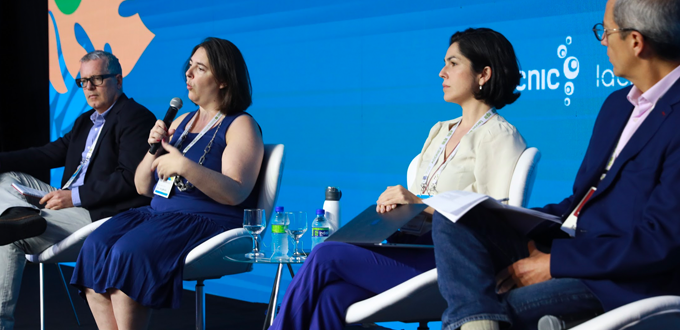Debate on “Fair Contribution” Models for the Allocation of Network Costs Gains Momentum
25/10/2023

Within the framework of the recent LACNIC 40 / LACNOG 2023 event, LACNIC provided a space for dialogue on the recent proposals for contribution models for investments in the development of network infrastructure, driven mainly by major telecommunications operators.
With the target set on large traffic generators (GGT), the proposals include initiatives such as Cost Sharing, Sending Party Pays, and Fair Share. Their goal is for telcos to recover investment costs, as they argue for the need to “ensure the future sustainability of the digital ecosystem in a scenario of exponential traffic growth, generated and monetized by major platforms.”
Cristiane Sanches, leader of the Abrint Council; Paula Bernardi, Senior Policy and Advocacy Advisor for the Internet Society; Gabriel Adonaylo, coordinator of LAC-IX (Latin American and Caribbean Internet Exchange Point Operators Association); and Raúl Echeberría, executive director of the Latin American Internet Association (ALAI) participated in the debate, which was moderated by Oscar Robles, executive director of LACNIC.
The conversation highlighted the various scopes of these models in areas such as Internet access, net neutrality, and financial issues, as well as their consequences for the different actors and components of the Internet ecosystem, small and large operators, content providers, Internet exchange points and, mainly, end users.
During the dialogue, participants explained that these initiatives originate mainly in the European Union, where telcos are calling for new models that will “…allow them to successfully compete in a market where the financial situation of the telecommunications sector has been deteriorating due to regulations focused on price reduction, which has intensified competition…”
In this context, organizations such as the European Telecommunications Network Operators’ Association (ETNO) have proposed alternatives such as a direct compensation by OTT providers of a certain size; solutions such as direct individual or collective negotiations between ISPs, telcos, and OTTs; contributions for the creation of a special fund; or the introduction of a digital tax.
One of the considerations that was raised is the impossibility of determining the size of the ISPs affected by these proposals.Likewise, participants insisted that the discussion is being reduced specifically to the “network utilization rate,” a variable that depends on the type of network, the users, which technologies are used, and other factors.
Attention was also drawn to how these types of regulations would affect end users.

In turn, concern was expressed over the different scenarios that may arise if a GGT does not enter into an agreement with an operator or fails to meet their agreed payment terms for any reason. Participants also warned that this might potentially result in “traffic fragmentation,” which might in turn weaken the principles on which the Internet is built. In addition to jeopardizing net neutrality, the situation could lead to inefficient infrastructure and substandard services for users or having to pay higher prices for connectivity, which would negatively affect those with lower income.
In addition to the degradation of services, the consequence for Latin America might include “enhanced data packages” for those who do sign agreements with the telecommunications companies. To illustrate this, the case of South Korea was mentioned. There, after the approval of the Fair Share regulation, some platforms chose not to enter into agreements with the telecommunications providers and relocated their content to CDNs in Japan. This resulted in a decrease in consumer experience quality, for example, a fourfold latency increase in connections to certain platforms.
Another point that was raised relates to network infrastructure and how content companies are investing to ensure that their content is delivered with high quality, close to the end-user. In this sense, interventions or regulations could potentially harm small content generators and undermine these companies’ investments.
As for Internet Exchange Points (IXPs), one of the aspects that was stressed is how the region currently has 15% more IXPs and how, together with voluntary peering agreements based on technical and financial need, these IXPs have successfully contributed to the development and strengthening of the Internet.
The final point to be raised was the importance of maintaining ongoing dialogue with telecommunications companies and to explore alternative solutions among the various actors involved.